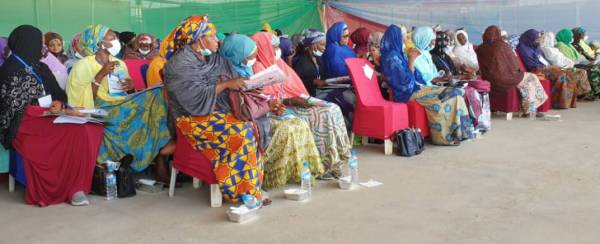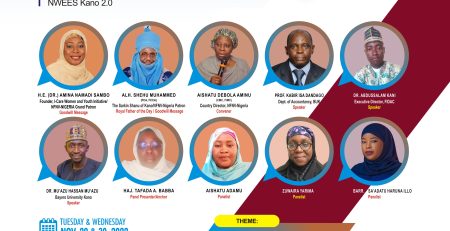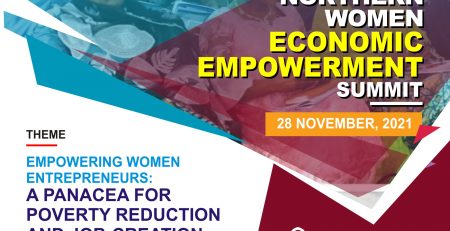NWEES 2021: Addressing Covid-19-induced setbacks for Northern women entrepreneurs
The Nigeria chapter of the New Faces New Voices (NFNV Nigeria) hosted the maiden edition of its Northern Women Economic Empowerment Summit (NWEES) in Kano, themed: “Empowering women entrepreneurs: A panacea for poverty reduction and job creation in North-West Nigeria”. Stephen Enoch reports
The one-day summit explored the prospects of addressing the high-level of unemployment and increasing poverty levels among women in Northern Nigeria, resulting from Covid-19 lockdowns and its attendant restrictions on business activities. In particular, the event explored the prospects of wealth creation to address the economic setbacks faced by women-owned businesses in North-western Nigeria. It accordingly sought to create a favourable environment for Northern women entrepreneurs to effectively engage in productive and profitable activities.
The New Faces New Voices (NFNV) is a pan-African women in finance network under the Graça Machel Trust (GMT) focused on building capacities of women in the financial sector, thus enabling them to become stakeholders in decision-making in the financial sector. This is based on NFNV’s belief that giving women 30% representation in politics would significantly enhance the majority of their aspirations including economic empowerment.

In her welcome remarks, Ms Aishatu Aminu, country director of NFNV Nigeria, said the Summit would enable Northern women entrepreneurs to acquire the necessary skills to build back better, thrive and scale-up their businesses, post-Covid-19 pandemic. She said women entrepreneurs constitute over 40% of Small and Medium Enterprises (SMEs) in the country thereby contributing significantly to economic development of Nigeria.
Ms Aminu explained that economically empowered women would break the intergenerational cycle of poverty within their families and consequently contribute towards enhancing the socio-economic wellbeing of their individual households as well as the overall development of their communities. “Women entrepreneurs are confronted with numerous challenges which are evident in constraints to do with access to financial products, business structures and markets, as well as socio-cultural bias, among others,” she noted.
In his remarks, Dr Dikko Radda, director general of the Small and Medium Enterprises Development Agency of Nigeria (SMEDAN), described women as the world’s biggest untapped resource adding that the economic transformation of the North-West region and Nigeria at large could only be achieved through the effective inclusion and integration of women into political and socio-economic affairs.
Dr Radda said: “Removing barriers such as discriminatory property and inheritance laws, traditional practices, lack of access to formal financial institutions, and time constraints due to family and household responsibilities, will create greater opportunities for sustainable enterprises owned and managed by women and in turn contribute to women’s economic empowerment and gender equity as well as well as generating employment opportunities and fostering sustainable development.”
Accordingly, the DG assured that SMEDAN had commenced plans towards the implementation of a series of women-focused entrepreneurship development programmes, in partnership with women business membership organisations such as NFNV, as part of deliberate efforts by government and other interested parties to overcome the challenges women entrepreneurs continue to grapple with.
In her remarks, H.E Amina Namadi Sambo, the founder of I-Care Women and Youth Initiative (ICWYI) cum grand patron of NFNV-Nigeria, charged the women entrepreneurs in attendance at the summit to take advantage of the various business funding opportunities presented during the event, underscoring the need for women to equip themselves with knowledge on how to access grants and other business financing opportunities being offered by organisations such as the Central Bank of Nigeria (CBN) and SMEDAN.
Alhaji Shehu Muhammed, Sarkin Shanun Kano cum NFNV-Nigeria patron, in his remarks said there had been a consistent increase in the number of women gaining prominence in both the public and the private sectors of the Nigerian economy and however noted with concern Northern women’s low tendency to advance from low-skilled agricultural and informal sector activities into a higher value-added activities in the formal sector as one of the major challenges for women entrepreneurs in Northern Nigeria.
“Although poverty is endemic in Nigeria, it is particularly challenging in the North where women tend to be at the receiving end of limited economic opportunities. Less than 50% of married women in the North do participate in making decisions, either alone or jointly with their husbands, on key domestic and family issues. Women have limited access to land, credit facilities, extension services, technologies and inputs which limit their productive capacities,” Muhammed stated.
Ms Furera Jumare, director general of the Jigawa State Investment Promotion Agency (InvestJigawa), while speaking on obstacles against women-owned enterprises and women’s potential for fostering economic growth, said although the over 23 million female entrepreneurs in Nigeria constitute 41% ownership of micro-businesses in the country, there were still insufficient economic empowerment and inclusion opportunities for women across all sectors of the economy.
Ms Jumare identified the absence of foundational skills, lack of access to finance, unprofessional business practices as well as lack of business development skills as major obstacles hindering the growth of women-owned businesses in Northern Nigeria. She therefore underlined mentorship, investment in digital skills, the creation of women-focused networking opportunities as well as access to skills and business development as crucial to addressing the challenges beveling northern women entrepreneurs.
“If most of the women in the informal sector could transcend to the formal sector, a lot of benefits await them, especially now with the emergence of the African Continental Free Trade Area (AfCFTA), which provides women-owned businesses the opportunity to expand their markets to other African countries, based on the AfCFTA’s vision of creating a One African Market thereby boosting Africa’s trade position in the global economy,” Ms Jumare said.
Culled from africannewspage.net.



